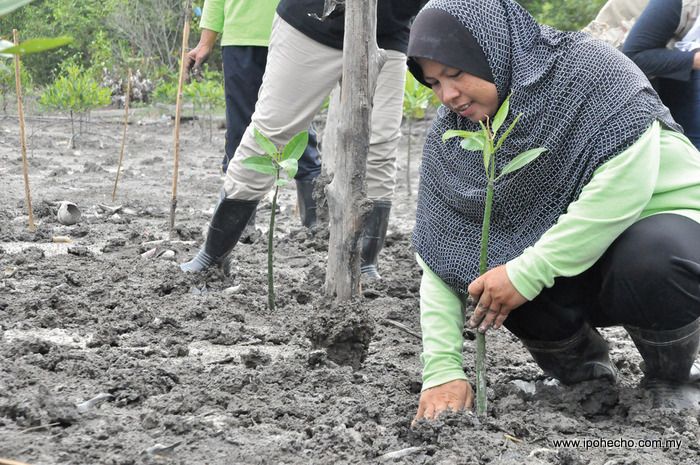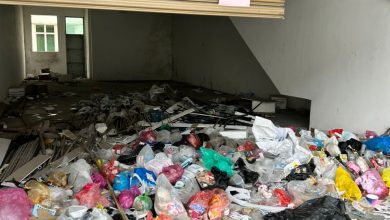For A Better Tomorrow


Over the years many have witnessed changes happening in Pulau Pangkor. What used to be one of the beautiful islands in Malaysia is currently on the verge of losing its tourists. It wasn’t because of the lack of promotions nor the attractions, but rubbish and dirt are slowly swallowing the island and it was obvious that something needed to be done to retrieve its reputation as a scenic spot.




Working Together


At the mangrove rehabilitation site in Kampung Sungai Tiram, Lekir, Mohammad Muhyiddin Hassan, the representative of ‘Sahabat Hutan Bakau Lekir Sitiawan (SHBLS)’ (Friends of Mangrove Forest Lekir Sitiawan) informed that the impact brought by the 2004 tsunami and some local activities are slowly destroying some of the oldest mangrove trees, “It is important for us to plant as many mangroves as we can because they play a major role in the ecosystem. Not only are we focusing on planting the trees, we are also working on recycling a few items such as plastic bottles, egg cartons and changing them into souvenirs and ornaments made by the locals,” added Muhyiddin. SHBLS is an organisation formed by locals who are concerned about the destruction of mangrove and are eager to join in the restoration process.
For the head of Kampung Sungai Tiram, Abdullah Ayub, he was more than happy to witness how much the village has changed ever since the programme started, “What GEC is doing with this village has not only helped in restoring the environment, but also contributed to the economic growth in the village,” added Abdullah. Located between the greenery site of Sitiawan and Manjung, Kampung Sungai Tiram definitely has the potential to be one of Perak’s Agro-tourism sites. The media was also given a chance to experience how to plant mangrove trees and witness demonstrations of making souvenirs from recyclable items.


Waste into Wealth
While SHBLS works on the rehabilitation of mangrove, another group of concerned locals in Pangkor, called the Island Ranger Sri Pangkor Community (KIRSP) is practising the concept ‘waste into wealth’ where they are using waste to provide a side income. The concept was introduced by Vale Malaysia and GEC.
“It has been our vision and dream to see Pangkor as an eco-friendly island that promotes ecotourism as well as helping the locals to regenerate their economy,” said the chairman of KIRSP, Sabariah Din. Plastic bottles, for example, are recycled to be made into decorations, while used cooking oil, through a series of processes, can be made into scented candles and soaps by KIRSP. Since it was established earlier this year, members of KIRSP are working hard to get their products to market; not only to be sold but also as a testament to the benefits of recycling.
“I am working on a few more products and plan to put them on sale at my husband’s shop one day,” said Hajizan Hashim who made colourful sets of flowers set in pots, using only plastic bottles.


The programme also involved schools in Pangkor where a recycling competition is currently being held at all five schools on the island; SK Seri Pangkor, SJKC Hwa Lian 1, SJKC Hwa Lian 2, SJKT Pangkor and SMK Pangkor. The media was given a chance to visit one of the recycling centres located at SK Seri Pangkor, “I loved the idea of this competition. Not only will this make Pangkor cleaner, it will create awareness in the students about the benefits and importance of recycling,” said SK Seri Pangkor’s headmaster, Fauzi Ab Latif. The winning school, scheduled to be announced later this year, will receive RM1500 in cash which Fauzi plans to use to decorate the school if they win.
Soon after the visit, the trip continued to Kampung Hujung Kelawai where a stream river monitoring session was held by the members of KIRSP and GEC. The team tested the physical, chemical and biological components of a nearby river using a special kit to determine the degree of cleanliness of the river. Thanks to their hard work of keeping the place clean, the tests came out negative from pollution.
Through this visit, it was clearly shown that the involvements of GEC, Vale Malaysia, University of Queensland Australia and other partners, in the process of reinstating the condition of Pangkor and Manjung is slowly showing positive results. Although much more work needs to be done to restore and rebuild, it was heartening to see the strong involvement by everyone in the community.
Ili Aqilah and Khaleeja


